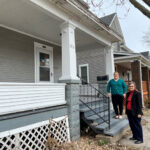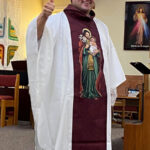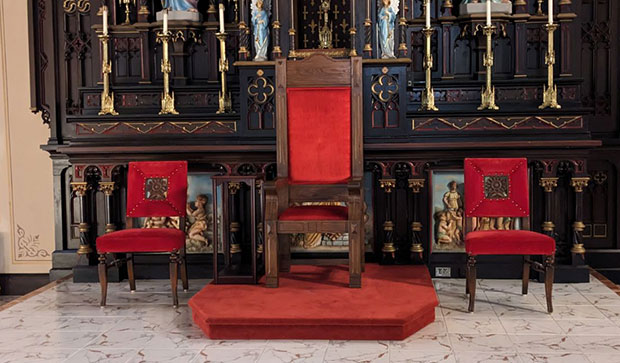
The bishop’s cathedra, or chair, sits empty at Sacred Heart Cathedral in Davenport as the Diocese of Davenport awaits the appointment of a new bishop.
By Barb Arland-Fye
The Catholic Messenger
The Oct.18 installation of Archbishop Thomas Zinkula as the Dubuque Archdiocese’s new archbishop leaves the Diocese of Davenport temporarily without a bishop. The Davenport Diocese is “sede vacante,” a Latin term that means the (bishop’s) chair is vacant.
Appointment of the next Bishop of the Davenport Diocese by Pope Francis could take six to eight months or longer, based on a thorough vetting process of candidates that begins at the diocesan level. For details about the process, read the U.S. Conference of Catholic Bishops’ explanation (https://tinyurl.com/ ws7n9ec3).
This is the first time in 79 years that a bishop leading the Davenport Diocese has been assigned to another diocese without a successor waiting in the wings, which led diocesan officials to prepare a document explaining what happens in the interim (davenportdiocese.org).
Administration of the Davenport Diocese will become the responsibility of either an apostolic or a diocesan administrator, the diocesan document states. To date, the Vatican has not appointed an apostolic administrator. Therefore, the Davenport Diocese’s College of Consultors, which must convene within eight days of the vacancy, will vote to elect a diocesan administrator, said Father Thom Hennen, one of the consultors. His fellow consultors are diocesan priests Fathers Nick Adam, Jason Crossen, Jake Greiner, Tony Herold, Rudolph Juarez, Ken Kuntz, Joseph Sia and Dave Steinle.
Each of the nine members, previously appointed by the (outgoing) bishop, act as special advisors and will assist the new diocesan administrator with the diocese’s governance. This body takes the place of the Presbyteral Council, which is dissolved during this time.
Any priest or bishop of the Davenport Diocese or another diocese who is at least 35 years old and outstanding in doctrine and prudence may serve as diocesan administrator. “I think it would be out of the ordinary to elect someone from outside the diocese,” Father Hennen said in response to a question from The Catholic Messenger. “Though, perhaps the Consultors could choose the archbishop (Archbishop Zinkula). I’m not sure how that works, if we would elect a bishop from a neighboring diocese. Certainly, he knows the territory and could delegate much of the day-to-day stuff, but he would already have one very full-time job in Dubuque.”
The likelihood of a diocesan administrator coming from another state is also “extremely slim.” Determining that priest’s qualifications without knowing him would be difficult, Father Hennen said. In addition, that priest would require clearance from his bishop. “I think it would be hard to oversee the day-to-day administration of the diocese remotely.”
Liturgical considerations
After his election, the new diocesan administrator must notify the Vatican. If he is not a bishop, he cannot perform any of the “sanctifying functions flowing from episcopal orders, such as ordinations and consecrating the oils at the Chrism Mass,” the diocesan document states. The diocesan administrator’s functions end when a new bishop takes possession of the diocese.
The diocesan administrator may delegate authority to the pastors to celebrate the sacrament of Confirmation in their parishes. Pastors and parish staffs should prepare for this eventuality, the diocesan document states. During Mass in the Davenport Diocese, reference to a bishop by name is omitted from the Eucharistic Prayer unless the diocesan administrator is a bishop.
Challenges that a diocesan administrator might face are hard to predict. “The idea is just to keep the ship on course, but we live in stormy times,” Father Hennen said. “I think if there were big things that came up, or important decisions that are within the diocesan administrator’s authority to make, he would want to consult the College of Consultors, much in the way a bishop would consult them and the Presbyteral Council. Perhaps there could also be some delegation of certain tasks to lighten the load on the diocesan administrator.”
No new policies and procedures
Current policies and procedures remain in force during the interim between bishops. The diocese cannot undertake any new policies or procedures nor make changes in its governance. Major projects and initiatives already underway may continue, such as the Davenport Diocese’s three-year plan stemming from this year’s Synodal Summit, and the Laudato Si’ Action Platform. New major projects and initiatives are not allowed. Also prohibited are parish mergers, building projects (unless in process) and alienation of property (unless in process).
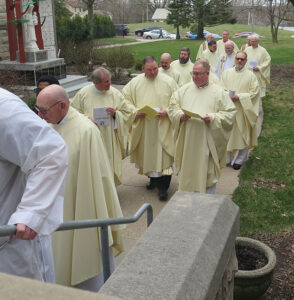
Several members of the College of Consultors, as well as other priests, process back to Sacred Heart Cathedral in Davenport following the Chrism Mass April 3.
Clergy appointments and retirements
“Pastors may not be appointed by the diocesan administrator unless the see has been vacant for a year, but other moves could be announced and priests could be assigned as ‘administrators,’ and later appointed as pastors once we have a bishop,” Father Hennen said. Priests who are 70 years or older may still retire.
The position of vicar general, who assists the bishop in administration and pastoral care of the diocese, ceases during the interim. “The reason the position of vicar general doesn’t exist when there is no bishop is that his ‘ordinary’ power of governance is delegated by and derived from the bishop,” said Father Hennen, who served as vicar general for Bishop Zinkula. “That being said, I believe the newly elected diocesan administrator could delegate those same powers of a vicar general to a priest of his choice to help in administration of the diocese.”
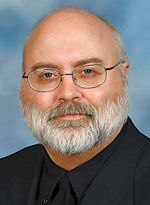
The position of chief of staff, which Deacon David Montgomery holds, remains in place. “Canon law says nothing about ‘chiefs of staff.’ That is a diocesan position that we created when the vicar general was no longer serving as the ‘moderator of the curia.’ As such, Deacon David would continue in this role,” Father Hennen said.










